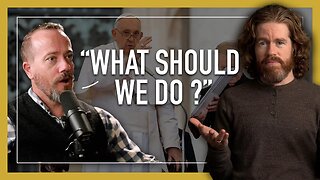Premium Only Content

The Case for Christ
Music written and generously provided by Paul Jernberg. Find out more about his work as a composer here: http://pauljernberg.com
Spanish translations by Vélez Translations, http://www.veleztranslations.com
CS Lewis once famously proposed a trilemma argument in support of the divinity of Jesus. He said that either Jesus was a lunatic, a liar, or the son of God.
What makes this argument so compelling is that there are a considerable number of people who are prepared to say that they think Jesus is a great moral teacher and guide, but not the son of God. But this is exactly what you can’t say about someone who claims to be of divine origin.
Jesus claimed to have come down from Heaven, he acted with an authority that everyone knew only God had, and when his followers confessed that he is the son of God, he affirmed them in this revelation.
Now a person like that, if they are not divine in nature, cannot be described as a good moral teacher. A good moral teacher doesn’t lay claim to the most audacious origin story imaginable if it isn’t true. He would have to be either a lunatic, a liar, or truly what he claims to be.
And based on the kind of person Jesus was in his teaching and life, the first two conclusions seem to be wholly incompatible which is why so many people quickly jump to this incoherent alternative without realizing how self contradictory it is.
But some people like to add a 4th alternative. They say, maybe it’s all legend. Maybe his followers crafted a highly sophisticated conspiracy to convince the masses that Jesus said and did all the things that are claimed about him in the New Testament.
What I find interesting about this explanation is that there are plenty of case studies from history for us to use to get a glimpse of what that would look like. These would be examples where devotees of powerful and influential people tried to manufacture a persona that would compel the general populace to treat that person with a similar devotion.
And in those cases, we often find a couple things that are characteristic of these attempts. They often involve very powerful people with extensive resources that can be dedicated to the deception and no matter how sophisticated their attempts to produce an effective conspiracy, they never hold together, especially with the passage of time and scrutiny of history.
Take world leaders like the emperors of Rome who attempted to position themselves in the cosmos along side the gods. But they all died, revealing their mortality, and were replaced by someone else making the same claim until, eventually, their empire fell to the same fate of all temporal things.
Or how about a religious figure like Mohammed, the founder of Islam. After struggling to win adherents as a peaceful preacher in Mecca, he moved to Medina where he quickly grew a militant following and reset his aims of conquest back on Mecca and neighboring regions and in the process of conquering these regions, gained huge spoils of wealth and power as a warlord.
Once securing this power, he acted in a way that anyone might expect of a powerful man. He indulged his carnal appetite by taking wives for himself, even more than the Qur’an allows, one of whom was only 9 years old and still played with dolls when he consummated their union.
He personally bought and sold slaves and he killed his enemies mercilessly, at one point executing hundreds of Jews in Medina. He also attempted suicide at one point. Eventually, he was poisoned by a woman whose family he killed.
Now maybe, none of that bothers you from a historical perspective. This is fairly typical behaviour from powerful historical characters. But that’s the point. If he was a prophet of God, someone who enjoyed intimate direct revelations from God, don’t you think there would be something different about him rather than the typical kind of fare we see from those who acquire and possess great power and wealth?
A more contemporary example might be found in the cult of personality among dictators of the 20th century with figures like Joseph Stalin who was portrayed as a wise, strong, and compassionate leader who in fact, didn’t seem to lose any sleep over the millions of Ukrainians he deliberately starved to death, or the countless personal associates who seemed to disappear from history altogether as he purged anyone he suspected as being a threat to his control.
The phenomenon of this kind of modern communist leadership is summarized well by Elena Gorokhova in her memoirs of living under Soviet tyranny when she said, “The rules are simple: they lie to us, we know they're lying, they know we know they're lying, but they keep lying to us, and we keep pretending to believe them.”
The point is these conspiracies, fashioned with huge resources and countless willing accomplices, still couldn’t manage to hold together. Falsehood is a fragile thing compared to the truth.
Read the whole transcript at https://brianholdsworth.ca
-
 11:57
11:57
Brian Holdsworth
1 year ago $0.09 earnedWhat Should Catholics Do?
4612 -
 LIVE
LIVE
Jeff Ahern
57 minutes agoThe Saturday show with Jeff Ahern
391 watching -
 LIVE
LIVE
ZWOGs
37 minutes ago🔴LIVE IN 1440p! - Sgt Wilky's WARZONEPALOOZA - Warzone Resurgence Tournament - Come Hang Out!
54 watching -
 LIVE
LIVE
Flexible Games
3 hours agoMasked Stranger in Grounded 2!
85 watching -
 LIVE
LIVE
DynastyXL
7 hours ago🔴LIVE: Fortnite The Comeback Stream Starts Here🎃
92 watching -
 LIVE
LIVE
BrightGaming
2 hours agoDragon Warrior 1 (NES): Defeat the DragonLord & Save the Kingdom as Erdrick's Heir with BrightGaming
584 watching -
 19:15
19:15
Stephen Gardner
19 hours ago🟢YES! Trump did it! + Elon Musk DROPS BOMBSHELL on Democrat Party!
110K226 -
 29:24
29:24
Afshin Rattansi's Going Underground
1 day agoEx-CIA Advisor & Afshin Rattansi Have HEATED Exchange Over Ukraine Proxy War
3.21K41 -
 1:06:17
1:06:17
Mike Rowe
20 hours agoThe Mastermind Behind THIS Radical Idea At WSU Tech | Sheree Utash #448 | The Way I Heard It
93.6K17 -
 1:29:13
1:29:13
I_Came_With_Fire_Podcast
14 hours agoAncient Egypt's Tech & the Secret Temples of Malta
17.2K4